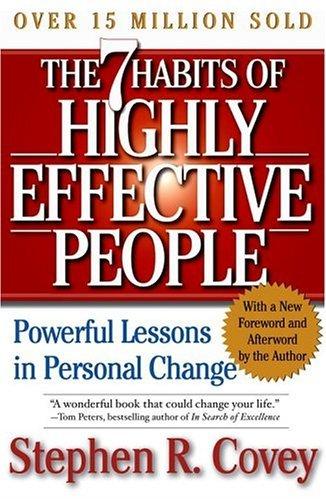
Live these principles day in day out and you will succeed, be loved, love, laugh and be happy forever.
Steven Covey is my guru! I have read this book twice and own every spin off the Covey machine have since published from the illustrated children’s 7 Habits book for tots, to the 7 habits workbook for teens, to the 7 habits bible for family harmony. He teaches logical guiding principles for life which work personally and professionally and I try to honour all of them every day without fail.
The seven habits are:-
First Independence
The First Three Habits surround moving from dependence to independence ie self-mastery:
- 1 – Be Proactive
- Talks about the concept of Circle of Influence and Circle of Concern. Work from the center of your influence and constantly work to expand it. Don’t sit and wait in a reactive mode, waiting for problems to happen (Circle of Concern) before taking action.
- 2 – Begin with the End in Mind
- Envision what you want in the future so you can work and plan towards it. Understand how people make decisions in their life. To be effective you need to act based on principles and constantly review your mission statement. Are you – right now – who you want to be? What do I have to say about myself? How do you want to be remembered? Change your life to act and be proactive according to the Habit 1. You are the programmer! Grow and stay humble.
- 3 – Put First Things First
- Talks about difference between Leadership and Management. Leadership in the outside world begins with personal vision and personal leadership. Talks about what is important and what is urgent. Priority should be given in the following order:
- 1) Important and Urgent
- 2) Important and not-urgent
- 3) Not Important and Urgent
- 4) Not important and Not urgent
Habit 2 says: you are the programmer. Habit 3: Write the program. Become a leader! Keep personal integrity: what you say vs what you do.
Interdependence
The next three habits talk about Interdependence (e.g. working with others):
- 4 – Think Win-Win
- Genuine feelings for mutually beneficial solutions or agreements in your relationships. Value and respect people by understanding a “win” for all is ultimately a better long-term resolution than if only one person in the situation had gotten their way. Think Win-Win isn’t about being nice, nor is it a quick-fix technique. It is a character-based code for human interaction and collaboration.
- 5 – Seek First to Understand, Then to be Understood
- Use empathic listening to genuinely understand a person, which compels them to reciprocate the listening and take an open mind to being influenced by you. This creates an atmosphere of caring, and positive problem solving.
- The Habit 5 is greatly embraced in the Greek philosophy represented by 3 words:
- 1) Ethos – your personal credibility. It’s the trust that you inspire, your Emotional Bank Account.
- 2) Pathos is the empathic side — it’s the alignment with the emotional trust of another person communication.
- 3) Logos is the logic — the reasoning part of the presentation.
- The order is important: ethos, pathos, logos — your character, and your relationships, and then the logic of your presentation.
- 6 – Synergize
- Combine the strengths of people through positive teamwork, so as to achieve goals that no one could have done alone.
Continuous Improvements
The final habit is that of continuous improvement in both the personal and interpersonal spheres of influence.
- 7 – Sharpen the Saw
- Balance and renew your resources, energy, and health to create a sustainable, long-term, effective lifestyle. It primarily emphasizes exercise for physical renewal, good prayer (meditation, yoga, etc.) and good reading for mental renewal. It also mentions service to society for spiritual renewal.
Covey explains the “Upward Spiral” model in the sharpening the saw section. Through our conscience, along with meaningful and consistent progress, the spiral will result in growth, change, and constant improvement. In essence, one is always attempting to integrate and master the principles outlined in The 7 Habits at progressively higher levels at each iteration. Subsequent development on any habit will render a different experience and you will learn the principles with a deeper understanding. The Upward Spiral model consists of three parts: learn, commit, do. According to Covey, one must be increasingly educating the conscience in order to grow and develop on the upward spiral. The idea of renewal by education will propel one along the path of personal freedom, security, wisdom, and power.
The Official The 7 Habits of Highly Effective People by Steven Covey Book Blurb
When it was first published in 1989, The 7 Habits of Highly Effective People was an almost instant bestseller–and quickly became a permanent part of the cultural lexicon. With over 25 million copies sold worldwide in over 40 languages since its first publication, this book continues to help millions of readers become more effective in both their personal and professional lives.
This is one of the rare books that has influenced presidents, CEOs, educators, and individuals all over the world not only to improve their businesses and careers but to live with integrity, service, dignity, and success in all areas of life. It has had an undeniable impact for the past 25 years–and will no doubt continue to be influential for many more.









